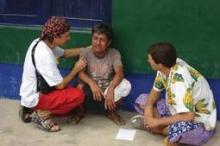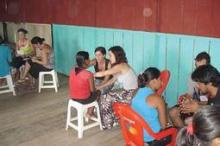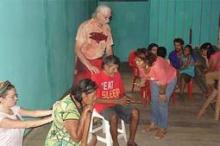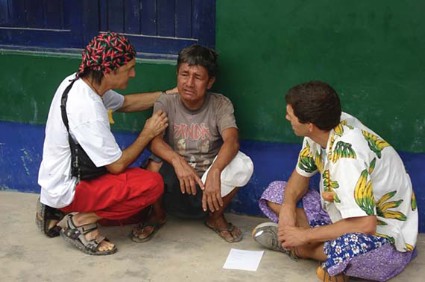User login
It’s becoming the exception for a psychiatrist to spend more than 15 minutes speaking face-to-face with patients. This is the unfortunate concomitant of a medical culture that reimburses us more for 15-minute medication reviews than for talking to patients for an hour.
Yet, we know that connecting with patients at some heartfelt level is critical to doing our work. It is the relationship that inspires their trust and encourages them to dare to imagine that they can create new endings to their old stories. It turns out that listening at that level can actually happen in a short time if you are truly present and paying attention.
I recently participated in a community mental health clinic in the streets of Iquitos, Peru, where I went with Dr. Patch Adams, the world’s most recognized humanitarian clown. One hundred clowns from all over the world participated in a collaborative preventive health project in a desperately impoverished section of town called Belen. They are performers, musicians, artists, teachers, students, entrepreneurs, students, and health workers.
We conducted workshops for children (percussion, dance, acrobatics, puppetry); painted homes and public murals; clowned in hospitals, prisons, and shelters; and supported local health organizations.
For the last 3 years, I’ve worked with Amazon Promise, a nonprofit organization that provides health care to indigenous people in the Amazon. I was the first psychiatrist willing to see patients in an open public space, without privacy or psychiatric drugs. I had a remarkable translator who wove my words into her own meaningful story that touched patients. People waited in line without shame, talking about their problems in full view of their neighbors. We discovered in these sessions that good things can happen – even in 20 minutes.
Among this year’s clown group were 20 clinical health professionals (psychologists, counselors, nurses, doctors, social workers, and body workers). We set up four half-day clinics in the streets of Belen, where we knew people would be gathering. We printed fliers that said health professionals who could offer help would be available for people who were experiencing problems at home (with spouses, children, or parents), couldn’t sleep, or had aches in their body.
Before the first clinic, I met with the clinicians and told them about my experiences over the last several years. In those meetings, the clinicians were in an open setting with no privacy, hearing stories that would make their hearts bleed (abuse, abandonment, sexual trauma), and they would wonder how anything in their training could help them deal with such overwhelming problems. I assured them that, in addition to the symptomatic manifestations of such grinding poverty, they would see a remarkable people with extraordinary resilience.
Perhaps the most significant thing we could do was simply listen to their stories: For many patients, 20 minutes with a compassionate listener was an exceptional event. If, in addition, they could help patients identify some strengths, offer some advice, or inspire hope, that would be an additional dividend.
We had no psychiatric drugs, so at the end of the sessions, we would give them vitamins for themselves and their children. I brought along some necklaces with a small silver medallion of the Virgin of Guadalupe that had been blessed by Huichol and Navajo shamans. I suggested to the clinicians that, if they saw patients who might benefit from having this reminder of their time together, they could share these special amulets with a blessing of their own ... "Whatever your heart prompts you to say at the moment."
We did not dress up in our usual clown regalia – only our clown noses identified us. We set up in a schoolyard, loading dock, and empty rooms. Upon arriving, we passed out the flyers and announced our presence through loudspeakers. Clinicians were paired up and each team huddled in a tight circle with their patient(s) so they could hear above the clamor. Clowns playing with children, veterinarians sterilizing dogs and cats, and laboratory technicians taking blood from kids surrounded the teams – all while the community casually strolled by.
Clinicians saw 200 people over 4 days; they listened to the breadth and depth of the human experience. Twenty minutes is a blink of an eyelash when measured against the length of one’s life, but it’s enough time to feel the pain of another and to reach out to touch them with compassion.
It is those moments, when we are reminded of our shared humanity, that make all suffering bearable. In a short time, in a public place, without privacy, not making diagnoses or prescribing drugs, patients and clinicians connected in a heartfelt way that had a positive impact on both. When we did a post questionnaire, patients said they would come back.
We are psychiatrists. We listen to patients. We reflect and enlighten. And if we really pay attention – even for only 20 minutes – we would be reminded of what we like doing best, and we can magnify our therapeutic efficacy.
Dr. Hammerschlag, a leading proponent of psychoneuroimmunology (mind-body-spirit medicine), is chief of community mental health at the Gesundheit! Institute in Hillsboro, W.Va. He also is affiliated with the Arizona Health Sciences Center at the University of Arizona. In addition, Dr. Hammerschlag is a professional keynote speaker and author of numerous books on healing, spirituality, and other topics. To get in touch with him, e-mail him at [email protected].
It’s becoming the exception for a psychiatrist to spend more than 15 minutes speaking face-to-face with patients. This is the unfortunate concomitant of a medical culture that reimburses us more for 15-minute medication reviews than for talking to patients for an hour.
Yet, we know that connecting with patients at some heartfelt level is critical to doing our work. It is the relationship that inspires their trust and encourages them to dare to imagine that they can create new endings to their old stories. It turns out that listening at that level can actually happen in a short time if you are truly present and paying attention.
I recently participated in a community mental health clinic in the streets of Iquitos, Peru, where I went with Dr. Patch Adams, the world’s most recognized humanitarian clown. One hundred clowns from all over the world participated in a collaborative preventive health project in a desperately impoverished section of town called Belen. They are performers, musicians, artists, teachers, students, entrepreneurs, students, and health workers.
We conducted workshops for children (percussion, dance, acrobatics, puppetry); painted homes and public murals; clowned in hospitals, prisons, and shelters; and supported local health organizations.
For the last 3 years, I’ve worked with Amazon Promise, a nonprofit organization that provides health care to indigenous people in the Amazon. I was the first psychiatrist willing to see patients in an open public space, without privacy or psychiatric drugs. I had a remarkable translator who wove my words into her own meaningful story that touched patients. People waited in line without shame, talking about their problems in full view of their neighbors. We discovered in these sessions that good things can happen – even in 20 minutes.
Among this year’s clown group were 20 clinical health professionals (psychologists, counselors, nurses, doctors, social workers, and body workers). We set up four half-day clinics in the streets of Belen, where we knew people would be gathering. We printed fliers that said health professionals who could offer help would be available for people who were experiencing problems at home (with spouses, children, or parents), couldn’t sleep, or had aches in their body.
Before the first clinic, I met with the clinicians and told them about my experiences over the last several years. In those meetings, the clinicians were in an open setting with no privacy, hearing stories that would make their hearts bleed (abuse, abandonment, sexual trauma), and they would wonder how anything in their training could help them deal with such overwhelming problems. I assured them that, in addition to the symptomatic manifestations of such grinding poverty, they would see a remarkable people with extraordinary resilience.
Perhaps the most significant thing we could do was simply listen to their stories: For many patients, 20 minutes with a compassionate listener was an exceptional event. If, in addition, they could help patients identify some strengths, offer some advice, or inspire hope, that would be an additional dividend.
We had no psychiatric drugs, so at the end of the sessions, we would give them vitamins for themselves and their children. I brought along some necklaces with a small silver medallion of the Virgin of Guadalupe that had been blessed by Huichol and Navajo shamans. I suggested to the clinicians that, if they saw patients who might benefit from having this reminder of their time together, they could share these special amulets with a blessing of their own ... "Whatever your heart prompts you to say at the moment."
We did not dress up in our usual clown regalia – only our clown noses identified us. We set up in a schoolyard, loading dock, and empty rooms. Upon arriving, we passed out the flyers and announced our presence through loudspeakers. Clinicians were paired up and each team huddled in a tight circle with their patient(s) so they could hear above the clamor. Clowns playing with children, veterinarians sterilizing dogs and cats, and laboratory technicians taking blood from kids surrounded the teams – all while the community casually strolled by.
Clinicians saw 200 people over 4 days; they listened to the breadth and depth of the human experience. Twenty minutes is a blink of an eyelash when measured against the length of one’s life, but it’s enough time to feel the pain of another and to reach out to touch them with compassion.
It is those moments, when we are reminded of our shared humanity, that make all suffering bearable. In a short time, in a public place, without privacy, not making diagnoses or prescribing drugs, patients and clinicians connected in a heartfelt way that had a positive impact on both. When we did a post questionnaire, patients said they would come back.
We are psychiatrists. We listen to patients. We reflect and enlighten. And if we really pay attention – even for only 20 minutes – we would be reminded of what we like doing best, and we can magnify our therapeutic efficacy.
Dr. Hammerschlag, a leading proponent of psychoneuroimmunology (mind-body-spirit medicine), is chief of community mental health at the Gesundheit! Institute in Hillsboro, W.Va. He also is affiliated with the Arizona Health Sciences Center at the University of Arizona. In addition, Dr. Hammerschlag is a professional keynote speaker and author of numerous books on healing, spirituality, and other topics. To get in touch with him, e-mail him at [email protected].
It’s becoming the exception for a psychiatrist to spend more than 15 minutes speaking face-to-face with patients. This is the unfortunate concomitant of a medical culture that reimburses us more for 15-minute medication reviews than for talking to patients for an hour.
Yet, we know that connecting with patients at some heartfelt level is critical to doing our work. It is the relationship that inspires their trust and encourages them to dare to imagine that they can create new endings to their old stories. It turns out that listening at that level can actually happen in a short time if you are truly present and paying attention.
I recently participated in a community mental health clinic in the streets of Iquitos, Peru, where I went with Dr. Patch Adams, the world’s most recognized humanitarian clown. One hundred clowns from all over the world participated in a collaborative preventive health project in a desperately impoverished section of town called Belen. They are performers, musicians, artists, teachers, students, entrepreneurs, students, and health workers.
We conducted workshops for children (percussion, dance, acrobatics, puppetry); painted homes and public murals; clowned in hospitals, prisons, and shelters; and supported local health organizations.
For the last 3 years, I’ve worked with Amazon Promise, a nonprofit organization that provides health care to indigenous people in the Amazon. I was the first psychiatrist willing to see patients in an open public space, without privacy or psychiatric drugs. I had a remarkable translator who wove my words into her own meaningful story that touched patients. People waited in line without shame, talking about their problems in full view of their neighbors. We discovered in these sessions that good things can happen – even in 20 minutes.
Among this year’s clown group were 20 clinical health professionals (psychologists, counselors, nurses, doctors, social workers, and body workers). We set up four half-day clinics in the streets of Belen, where we knew people would be gathering. We printed fliers that said health professionals who could offer help would be available for people who were experiencing problems at home (with spouses, children, or parents), couldn’t sleep, or had aches in their body.
Before the first clinic, I met with the clinicians and told them about my experiences over the last several years. In those meetings, the clinicians were in an open setting with no privacy, hearing stories that would make their hearts bleed (abuse, abandonment, sexual trauma), and they would wonder how anything in their training could help them deal with such overwhelming problems. I assured them that, in addition to the symptomatic manifestations of such grinding poverty, they would see a remarkable people with extraordinary resilience.
Perhaps the most significant thing we could do was simply listen to their stories: For many patients, 20 minutes with a compassionate listener was an exceptional event. If, in addition, they could help patients identify some strengths, offer some advice, or inspire hope, that would be an additional dividend.
We had no psychiatric drugs, so at the end of the sessions, we would give them vitamins for themselves and their children. I brought along some necklaces with a small silver medallion of the Virgin of Guadalupe that had been blessed by Huichol and Navajo shamans. I suggested to the clinicians that, if they saw patients who might benefit from having this reminder of their time together, they could share these special amulets with a blessing of their own ... "Whatever your heart prompts you to say at the moment."
We did not dress up in our usual clown regalia – only our clown noses identified us. We set up in a schoolyard, loading dock, and empty rooms. Upon arriving, we passed out the flyers and announced our presence through loudspeakers. Clinicians were paired up and each team huddled in a tight circle with their patient(s) so they could hear above the clamor. Clowns playing with children, veterinarians sterilizing dogs and cats, and laboratory technicians taking blood from kids surrounded the teams – all while the community casually strolled by.
Clinicians saw 200 people over 4 days; they listened to the breadth and depth of the human experience. Twenty minutes is a blink of an eyelash when measured against the length of one’s life, but it’s enough time to feel the pain of another and to reach out to touch them with compassion.
It is those moments, when we are reminded of our shared humanity, that make all suffering bearable. In a short time, in a public place, without privacy, not making diagnoses or prescribing drugs, patients and clinicians connected in a heartfelt way that had a positive impact on both. When we did a post questionnaire, patients said they would come back.
We are psychiatrists. We listen to patients. We reflect and enlighten. And if we really pay attention – even for only 20 minutes – we would be reminded of what we like doing best, and we can magnify our therapeutic efficacy.
Dr. Hammerschlag, a leading proponent of psychoneuroimmunology (mind-body-spirit medicine), is chief of community mental health at the Gesundheit! Institute in Hillsboro, W.Va. He also is affiliated with the Arizona Health Sciences Center at the University of Arizona. In addition, Dr. Hammerschlag is a professional keynote speaker and author of numerous books on healing, spirituality, and other topics. To get in touch with him, e-mail him at [email protected].




